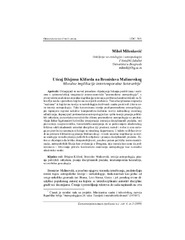Приказ основних података о документу
Uticaj Džejmsa Kliforda na Bronislava Malinovskog - moralne implikacije intertemporalne heterarhije
James Clifford's influence on Bronislaw Malinowski: The moral implications of intertemporal heterarchy
| dc.creator | Milenković, Miloš | |
| dc.date.accessioned | 2021-10-12T10:58:12Z | |
| dc.date.available | 2021-10-12T10:58:12Z | |
| dc.date.issued | 2009 | |
| dc.identifier.issn | 0353-1589 | |
| dc.identifier.uri | http://reff.f.bg.ac.rs/handle/123456789/887 | |
| dc.description.abstract | Oslanjajući se na već ponuđeno objašnjenje brkanja pozitivizma i realizma u epistemološkoj imaginaciji autora-zasnivača 'postmoderne antropologije', u ovom tekstu analiziram moralne implikacije rešavanja problema karakterističnih za filozofiju nauke upotrebom književno-teorijskih sredstava. Transdisciplinarna migracija 'realizma' iz književne teorije u metodologiju društvenih nauka proizvodi čitavu novu istoriju antropologije. Tako konstruisana istorija pred-postmoderne antropologije, pre ispunjava registar nekakve komparativno-kulturne teorije naknadnog moralnog odlučivanja, dopunjujući postmodernu antropologiju kao opštu teoriju pisanja politician subjekata, pa teorijsko-metodološke dileme postmoderne antropologije ne predstavljaju dokaz legitimnosti holističke interpetacije intencija disciplinarnih predaka, već provociraju neopironistička formalistička nastojanja da se poštovanjem akademskog folklora održi akademski autoritet discipline čiji predmet, metod i svrhu iz niza razloga po pravilu ne razumeju ni kolege sa susednog departmana. U tekstu se dokaz izvodi na primeru Klifordovog pisanja Malinovskog i izvode moralne implikacije nesrećne analogije između pisanja političkih subjekata i pisanja disciplinarnih predaka. Zatim se objašnjava da kritika zloupotrebljivosti posebno putem političke instrumentalizacije, antropoloških fikcija kao evidencije o Drugima, nije morala kao cenu da pod-razumeva i žrtvovanje privida kontinuiteta zasnivanja antropologije kao normalne akademske nauke. | sr |
| dc.description.abstract | Drawing on the explanation already offered for the confusion of positivism with realism in the epistemological imagination of the author and founder of postmodern anthropology, the paper analyzes the moral implications of dealing with problems characteristic of the philosophy of science by literary-theoretical means. The transdisciplinary migration of 'realism' from literary theory to social science methodology has produced a whole new history of anthropology. The history of pre-postmodern anthropology constructed in this manner can be said to fit the register of some sort of comparative-cultural theory of retroactive moral judgement, complementing postmodern anthropology as a general theory of writing by political subjects, so that the theoreticalmethodological dilemmas of postmodern anthropology do not constitute proof of the legitimacy of a holistic interpretation of the discipline's founders' intentions, but rather lead to neo-pyrrhonic, formalistic endeavours to uphold, by respecting academic trappings, the academic authority of the discipline whose subject, method and purpose, as a rule, even colleagues from adjacent departments for various reasons fail to understand. In the paper, evidence for this is derived from Clifford's writing of Malinowski, and the moral implications of the unfortunate analogy between the writing of political subjects and the writing of disciplinary founders are followed through. The paper then goes on to explain that the critique of the possibilities of misuse, particularly through political instrumentalization, of anthropological fictions as evidence of Others did not have to come at the cost of sacrificing the semblance of continuity in the establishment of anthropology as a proper academic discipline. | en |
| dc.publisher | Univerzitet u Beogradu - Filozofski fakultet - Odeljenje za etnologiju i antropologiju, Beograd | |
| dc.relation | info:eu-repo/grantAgreement/MESTD/MPN2006-2010/147037/RS// | |
| dc.rights | openAccess | |
| dc.rights.uri | https://creativecommons.org/licenses/by/4.0/ | |
| dc.source | Etnoantropološki problemi | |
| dc.subject | reverzibilna genealogija | sr |
| dc.subject | pisanje političkih subjekata | sr |
| dc.subject | pisanje disciplinarnih predaka | sr |
| dc.subject | istorija antropologije | sr |
| dc.subject | intertemporalna heterarhija | sr |
| dc.subject | Džejms Kliford | sr |
| dc.subject | Bronislav Malinovski | sr |
| dc.subject | the writings of political subjects | en |
| dc.subject | the writings of disciplinary founders | en |
| dc.subject | reversible genealogy | en |
| dc.subject | James Clifford | en |
| dc.subject | intertemporal heterarchy | en |
| dc.subject | history of anthropology | en |
| dc.subject | Bronislaw Malinowski | en |
| dc.title | Uticaj Džejmsa Kliforda na Bronislava Malinovskog - moralne implikacije intertemporalne heterarhije | sr |
| dc.title | James Clifford's influence on Bronislaw Malinowski: The moral implications of intertemporal heterarchy | en |
| dc.type | article | |
| dc.rights.license | BY | |
| dc.citation.epage | 30 | |
| dc.citation.issue | 3 | |
| dc.citation.other | 4(3): 17-30 | |
| dc.citation.rank | M24 | |
| dc.citation.spage | 17 | |
| dc.citation.volume | 4 | |
| dc.identifier.doi | 10.21301/eap.v4i3.1 | |
| dc.identifier.fulltext | http://reff.f.bg.ac.rs/bitstream/id/2408/884.pdf | |
| dc.type.version | publishedVersion |

